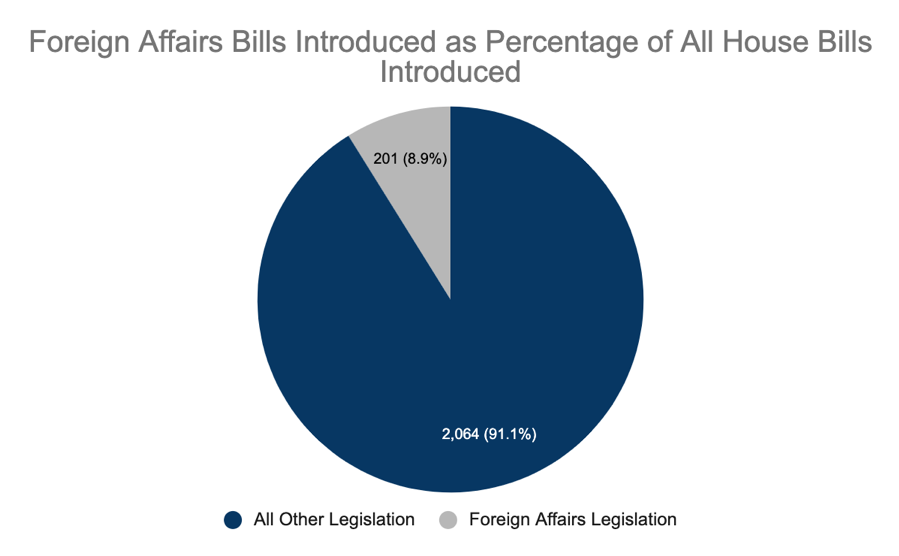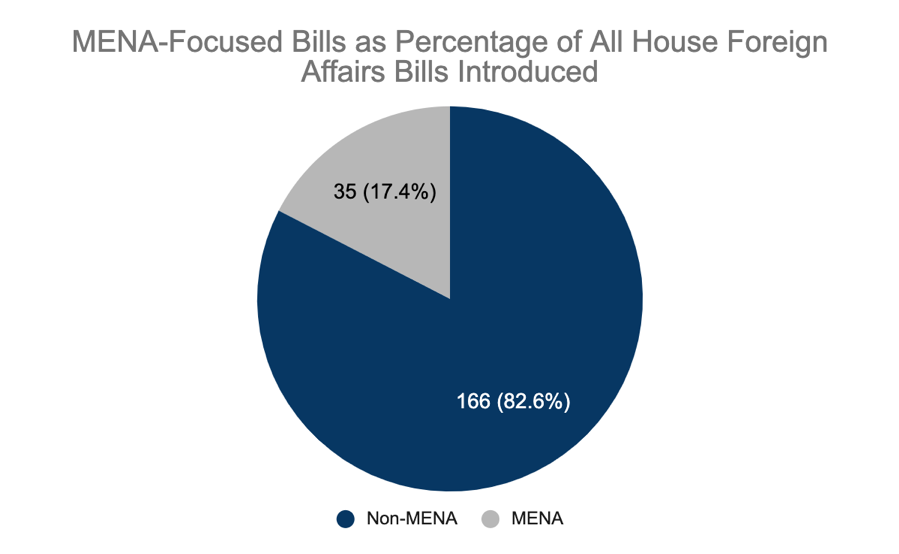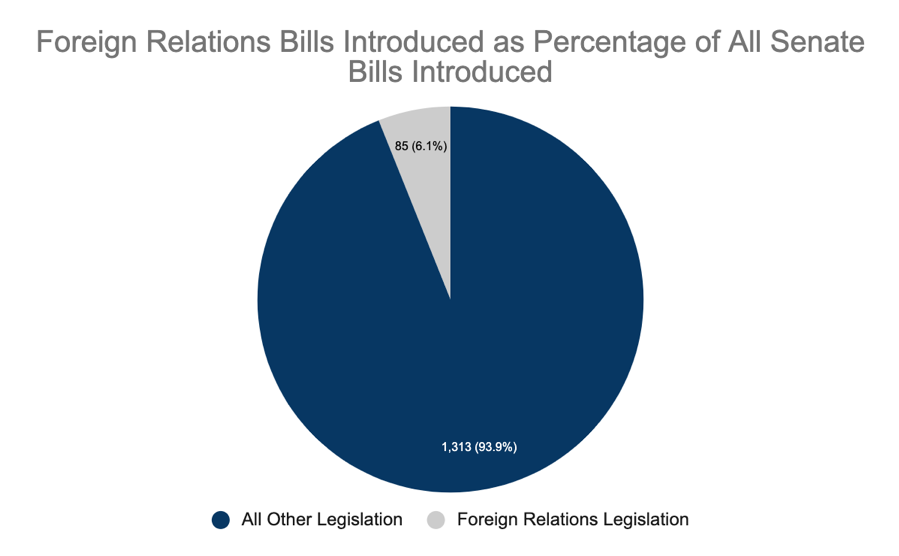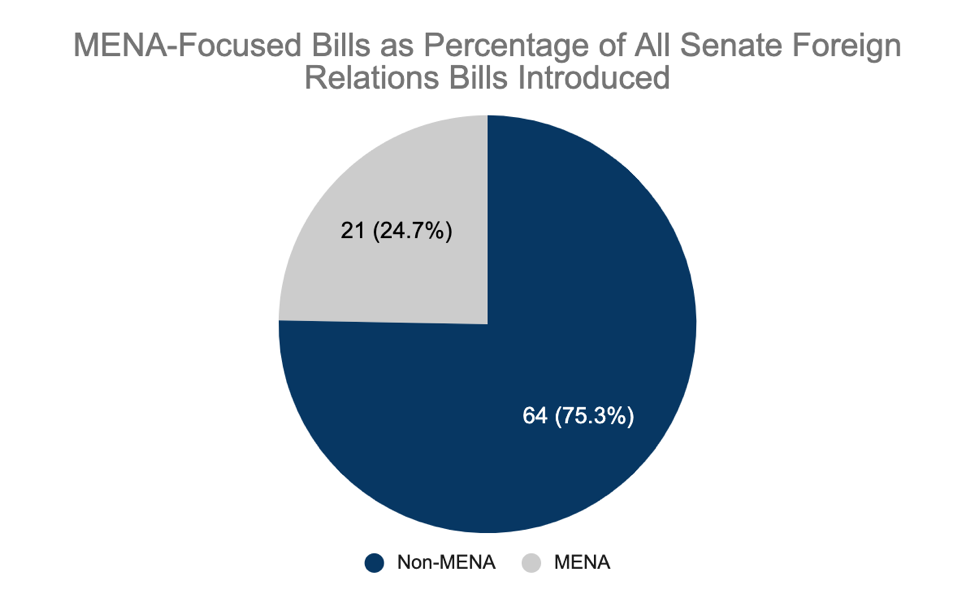Introduction
Six months into the 117th Congress, legislators continued to grapple with the complexities of a region in the midst of change. The reasons for this phenomenon were myriad. The Biden administration espoused a divergent worldview from that of its predecessor, the balance of power in Congress shifted, the international community continued to struggle with the ramifications of COVID-19, the Abraham Accords altered the dynamics between Israel and other regional actors, while the outbreak of violence between Israel and Gaza attracted attention from both sides of the aisle. Legislators offered an increased number of proposals to address these and other realities in the second quarter of 2021, marking a sharp uptick in legislation focused on MENA compared to the first quarter of the year.
This article chronicles select congressional action concerning MENA during the second quarter of 2021. Its scope is limited to hearings and legislation targeting at least one MENA country for which the congressional committees with jurisdiction over foreign affairs and appropriations exercised their authority. For the purposes of this article, MENA is defined as the area including North Africa, the Levant, Turkey, the Gulf, Yemen, and Iran. Legislation or hearings not targeting at least one MENA country and considered under the authority of at least one of these committees during the covered timeframe was not assessed.
This review demonstrates congressional interest in Israel, the Palestinian Territories, and Iran during the second quarter of 2021. This stands in contrast to congressional interest during the first quarter of the year, during which time Congress focused largely upon Saudi Arabian human rights violations, the authorization for the use of military force in Iraq, Iran sanctions, and the ongoing atrocities in Syria.
House of Representatives
- Hearings
The House Committee on Foreign Affairs (HFAC) did not hold any hearings directly focused on the MENA region during the second quarter.[1] However, its Subcommittee on the Middle East, North Africa, and Global Counterterrorism held hearings concerning the ongoing conflict in Syria, the crisis in Yemen, and COVID-19 in the MENA region. Similarly, the House Appropriations Committee did not hold any hearings focused upon the MENA region this quarter, although its Subcommittee on State, Foreign Operations, and Related Programs held hearings concerning the U.S. Agency for International Development’s FY’22 budget request, Department of State’s FY’22 budget request, and Department of Treasury’s FY ’22 budget request for international programs. No other committees were surveyed.
- Legislation introduced
During the second quarter of the year, 2,265 bills were introduced in the House of Representatives. Of these, 201 were referred to HFAC in some capacity, constituting 8.9% of all bills introduced in the House during this timeframe. Among the bills referred to HFAC, 35 concerned the Middle East and North Africa, constituting 17.4% of all foreign affairs legislation and 1.5% of all legislation introduced in the House during this timeframe. A majority of these MENA-focused bills concentrated upon Israel, the Palestinian Territories, or Iran.


A complete table of MENA-focused legislation introduced during this timeframe that were referred to HFAC, in whole or in part, can be found here.
The House Appropriations Committee, for its part, released the FY’22 State, Foreign Operations, and Related Funding bill in late June. Upon introduction, it totaled $62.24 billion — 12.1% more than the previous year.[2]
- Legislative action
The House Foreign Affairs Committee held two markups between April and June that included MENA-focused legislation. The April markup approved both Rep. Joe Wilson’s “Bassam Barabandi Rewards for Justice Act” and Rep. Ted Deutch’s “Libya Stabilization Act”, by voice vote, among other non-MENA bills considered.[3] The May markup approved Rep. Abigail Spanberger’s resolution “[t]o repeal the Authorization for Use of Military Force Against Iraq Resolution” and Rep. Peter Meijer’s resolution “[t]o repeal the joint resolution entitled ‘A joint resolution to promote peace and stability in the Middle East'”, as amended, by voice vote, among other, non-MENA bills considered.[4]
Five MENA bills passed the House of Representatives during this timeframe: (1) Protection of Saudi Dissidents Act of 2021; (2) To repeal the Authorization for Use of Military Force Against Iraq Resolution of 2002; (3) To repeal the Authorization for Use of Military Force Against Iraq Resolution; (4) To repeal the joint resolution entitled “A joint resolution to promote peace and stability in the Middle East”; and (5) Trans-Sahara Counterterrorism Partnership Program Act of 2021. However, none of these bills passed the Senate, let alone were signed into law.
Senate
- Hearings
While the Senate Committee on Foreign Relations (SFRC) did not hold any hearings directly focused upon the MENA region during the second quarter, its Subcommittee on Near East, South Asia, Central Asia, and Counterterrorism held one concerning U.S. policy on Yemen.[5] In contrast, the Senate Appropriations Committee held a hearing on the State Department’s FY’22 budget request and its Subcommittee on State, Foreign Operations, and Related Programs held one on the U.S. Agency for International Development’s FY’22 budget request. No other committees were surveyed.
The Senate also advanced the nominations of numerous individuals during this timeframe. Its three most significant MENA-related nominations actions were confirming Wendy Sherman as Deputy Secretary of State, confirming Samantha Power as Administrator of the U.S. Agency for International Development, and placing Elizabeth Aubin’s nomination to serve as U.S. Ambassador to Algeria on the Senate Executive Calendar.
- Legislation introduced
During the second quarter of the year, 1,398 bills were introduced in the Senate. Of these, 85 were referred to SFRC in some capacity, constituting 6.1% of all legislation introduced in the Senate during this timeframe. Among the bills referred to SFRC, 21 concerned MENA, constituting 24.7% of all foreign affairs legislation and 1.5% of all legislation introduced in the Senate during this timeframe. A majority of these MENA-focused bills concentrated upon Israel, the Palestinian Territories, or Iran.


A complete table of MENA-focused legislation introduced during this timeframe that were referred to SFRC, in whole or in part, can be found here.
- Legislative action
The SFRC was scheduled to hold two markups during this timeframe to consider MENA-focused legislation. The first markup was slated to consider three MENA-focused bills: (1) “A joint resolution to repeal the authorizations for use of military force against Iraq, and for other purposes”; (2) “Israel Relations Normalization Act of 2021”; and (3) “A resolution congratulating the people of the Hashemite Kingdom of Jordan on the centennial of the founding of the Jordanian state.” Instead, SFRC held over all three bills. The second markup, conducted the very next day, approved the Israel Relations Normalization Act through an amendment in the nature of a substitute. However, the resolution concerning the Iraq AUMF and the resolution pertaining to Jordan’s centennial were not marked up during this timeframe, despite originally being listed on the June 22 markup calendar.
In contrast to the House, no MENA-focused legislation passed the Senate during this timeframe.[6]
Conclusion
During the past three months, the House of Representatives made strides by passing legislation pertaining to Saudi dissidents, the Iraq AUMFs, 1957 Eisenhower Middle East force resolution, and Saharan counterterrorism. It also introduced its FY’22 State, Foreign Operations, and Related Programs funding bill, which was marked up on July 1. In contrast, the Senate did not pass any MENA-focused legislation, nor did it introduce an FY’22 State, Foreign Operations, and Related Programs funding bill during this timeframe. No MENA-focused legislation became law and both chambers demonstrated strong interest in Israel, the Palestinian Territories, and Iran. Whether these trends hold true for the next quarter remains to be seen.
 Eurasia Press & News
Eurasia Press & News




